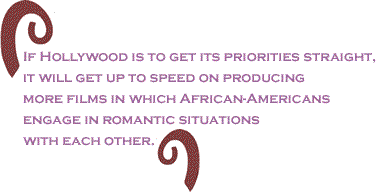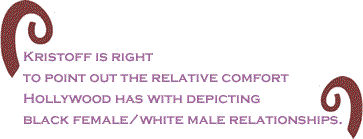
|
|||||||||||||||||||||
|
This article originally appeared in IntelligenceSquad.com. In a recent New York Times, columnist Nicholas Kristof asks when Hollywood will release a major motion picture in which a black man and white woman fall in love. Kristof raises an interesting point, but we feel his complaint misses the real problem, which is that Hollywood has shown a frustrating reluctance toward depicting romance between black men and black women. Kristof’s citing of Denzel Washington by way of example is particularly illustrative. In his last twelve movies dating back to the year 1998, Denzel – the most popular black film actor in American history – has been romantically paired with a black woman lead exactly once. In "The Manchurian Candidate," "Man on Fire," "Antwone Fisher," "Remember the Titans," "The Hurricane," "The Bone Collector," "The Siege," and "Fallen" Denzel has no major romantic partner at all. Likewise the films "Courage Under Fire," "Virtuosity," "Crimson Tide," "The Pelican Brief," "Much Ado About Nothing," "Ricochet," "Heart Condition," "Glory," "Power," "A Soldier’s Story," and "Carbon Copy." In "Bone Collector" and "Pelican Brief" Denzel is paired with a white female lead (Angelina Jolie and Julia Roberts, respectively) who, though single, attractive, and facing classic Hollywood ‘woman-in-peril-looking-for-knight-in-shining-armor’ scenarios, managed not to "hook up" with the handsome Washington throughout their respective films. In "John Q," his character is married to a black woman played by Kimberly Elise, with whom he shares little in the way of romance throughout the suspense/drama. In "Manchurian Candidate," Elise plays a strange friend-like character who invites Denzel to stay in her apartment for an indefinite period. It is never even alluded to in the movie whether she has "relations" with him. In "Training Day," Denzel’s girlfriend is played by Latina actress Eva Mendes (also cited by Kristof in his column for being paired with Will Smith in this year’s "Hitch"). Note how far Hollywood had to go to pull this pairing off: Mendes’s character is the only person in her entire neighborhood who is not black. Where in the world they imported her from to drop her into this film’s black ghetto is beyond us.
In "Mississippi Masala" Denzel falls for an Indian woman. In the thriller "Out of Time" Denzel has a romantic affair with a married character played by black actress Sanaa Lathan. By the end of the film, Lathan has double-crossed Denzel, who begins to show rekindled interest in his colleague and ex-wife, played by…Eva Mendes. In "He Got Game," his character falls for a white prostitute. You have to go to "The Preacher’s Wife" – nine years and 13 movies ago – to find Denzel in a traditional Hollywood romantic pairing with a black lead actress (Whitney Houston).
Kristof also cites actress Reese Witherspoon, one of Hollywood’s blonde "it" girls of the moment, in his dream interracial casting scenario. But in doing so he overlooks Julia Stiles – who, while not as blonde as Witherspoon, is at least as white. Twice in the last four years Stiles has played opposite black romantic leads (Mekhi Phifer in "O" and Sean Patrick Thomas in "Save the Last Dance"). Kristof is right, though, to point out the relative comfort Hollywood – and by extension, America – has with depicting black female/white male relationships. Witness Halle Berry, who in the past decade has played opposite non-black leads in "Catwoman," "Die Another Day," "Monster’s Ball," "Swordfish," "Introducing Dorothy Dandridge," "Bulworth," the TV movie "The Wedding," and "The Rich Man’s Wife," and opposite blacks in just the TV movie "Their Eyes Were Watching God" and the bio-pic "Why Do Fools Fall In Love?" 2006 expects to see releases in which Berry plays a woman who is raped by a white man and Lathan plays a woman who, determined to marry and finding few good black prospects, partners with a white man.
Being half of an interracial couple himself, Kristof has fair reason to wonder out loud about Hollywood’s lack of recognition of certain types of such couples. But if Hollywood is to get its priorities straight, it will get up to speed on producing more films along the lines of "The Best Man," "Brown Sugar," "Love and Basketball," and "Disappearing Acts" – in which African-Americans engage in romantic situations with each other – before worrying about depicting the much rarer interracial relationship. Tom Grayman is an activist, pollster, and author of the book Ghosts of Florida: Making Elections Fair for Blacks. This commentary originally appeared on his website link IntelligenceSquad.com. He can be reached at [email protected]. |
Your comments are always welcome. Visit the Contact Us page to send e-Mail or Feedback or Click here to send e-Mail to [email protected] e-Mail re-print notice
If you send us an e-Mail message we may publish all or part of it, unless you tell us it is not for publication. You may also request that we withhold your name. Thank you very much for your readership. |
| May 5 2005 Issue 137 |
|||||||||
|
|||||||||
|
|
|||||||||
| Printer Friendly Version | |||||||||
 |
|||||||||
 |
|||||||||
| |
|||||||||
| |
|||||||||




























